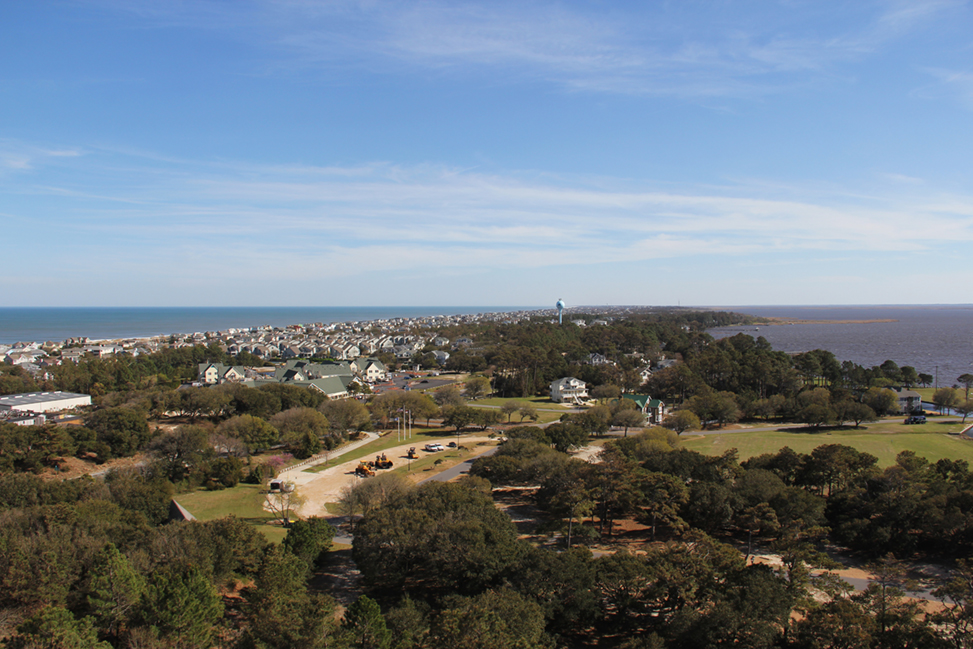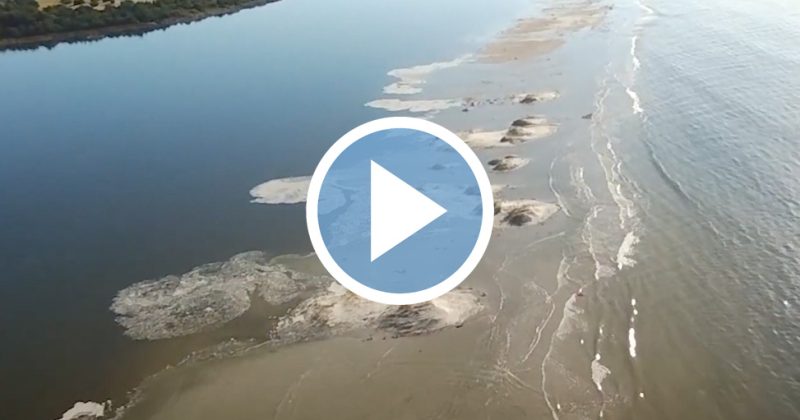
The North Carolina coast has experienced several extreme weather events in recent years, and a team of interdisciplinary researchers is examining the long-term effects. (photo by Alyssa LaFaro)
A diverse team of researchers is addressing the long-term impact of extreme weather.
The 2020 Atlantic hurricane season broke records on multiple levels. While the season usually runs from June 1 to Nov. 30, the first two storms — Arthur and Bertha — developed in May. Of the 30 storms that formed, 12 became hurricanes, the last of which made landfall in Nicaragua on Nov. 16. This tally represents the most storms on record, surpassing the 28 from 2005.
Over 127 million people live in coastal communities in the United States. That’s 40% of the nation’s population. What’s more, these communities have a huge impact on the economy, accounting for more than $9 trillion in goods and services.
That’s why a team of researchers at UNC is addressing the long-term impacts of extreme events — hurricanes, floods and forest fires — on North Carolina’s coast from an interdisciplinary perspective.
Led by Carolina Population Center Director and sociologist Elizabeth Frankenberg, the Dynamics of Extreme Events, People and Places (DEEPP) project brings together social and natural scientists, engineers, public policy researchers and data analysts to investigate extreme weather events from all angles, including impacts on health and well-being, economic hardships and environmental harm. Initial funding for this project came from the Creativity Hubs, a seed-funding program out of UNC Research.
Using satellite imagery, geophysical models and survey data, Frankenberg and her team hope to document the short- and long-term impacts of flood events and how people recover from them to help coastal communities in North Carolina and elsewhere prepare for the coming decades — and the storms they’ll continue to face.

Frankenberg is interviewing people about how they’ve been affected by Hurricanes Matthew, Florence and Dorian. Conducted in-person and over the phone, the survey includes questions about damage to property and possessions, disruption to day-to-day life, stress, assistance to and from family and neighbors, and access to recovery programs. Frankenberg and her team hope to continue this work to understand the evolution of impact and recovery over time.
UNC Institute of Marine Sciences Director Rick Luettich is using a storm-surge modeling system called ADCIRC to recreate recent major hurricanes that have hit coastal North Carolina. The DEEPP team will then combine this information with remote sensing data from satellites and airborne sensors to create detailed maps of flooding produced during these storms. This tool will help guide and interpret Frankenberg’s human health surveys and will inform people living in flood-prone regions about their vulnerability.
People who recognize flood risks to their property will sometimes sell their homes to the federal government. These are called floodplain buyouts. Todd BenDor, a professor of city and regional planning and director of the Odum Institute, strives to gather data on these transactions to understand their long-term financial impacts on cities.
Most recently, BenDor assessed buyouts in eight North Carolina communities and found that properties bought at random in various locations prevent effective land use. If several properties in the same area are purchased, though, that land can be converted into public parks or greenways, ultimately boosting the tax base. Most buyouts, unfortunately, end up as vacant mowed lots that are expensive to maintain. BenDor is particularly interested in studying local governments that permit new construction on floodplains.
UNC Institute for the Environment Director Michael Piehler, who is also a marine scientist, examines the impact on the coastal environment. He researches where land and water intersect, observing how natural and humanmade systems protect coastal towns before, during and after storm events. As part of this work, Adam Gold, a Ph.D. student working with Piehler, has created a stormwater network mapping tool for Wilmington, North Carolina, that shows all the stormwater pipes for the area, highlighting the ones that no longer function.
Frankenberg, Luettich, BenDor and Piehler are just a few of many researchers working on this project. Others are researching topics such as how natural disasters affect schools, contaminate water systems and lead to public policies that mitigate risk. This breadth of expertise is key to developing short- and long-term solutions to climate change.
Thanks to a recent $3.5 million grant from the National Science Foundation’s Growing Convergence Research program, the team is confident that its approach is worth pursuing. This is UNC’s first GCR award, given to researchers with big ideas to tackle specific, compelling, interdisciplinary problems.
“This is confirmation that we’re on the right track,” Frankenberg said. “The NSF grant is the lift to get off the ground. You need that fuel to really climb.”
By Alyssa LaFaro, editor of Endeavors magazine. Read a longer feature about the DEEPP project. Watch a video detailing the research.
Read other stories about convergent science research:
Published in the Spring 2021 issue | Features
Read More

New gift from the Craver family to name the College of Arts & Sciences deanship
Longtime Carolina advocates and supporters Vicki ’92 and David Craver…

Building resilience for storm-battered N.C.
The record-breaking 2020 Atlantic hurricane season included 30 storms, and…

$38.2 million NIH grants will support study of adolescent-to-adult health
The Carolina Population Center has received two grants, providing an…

